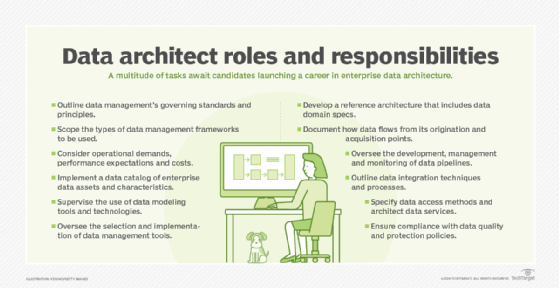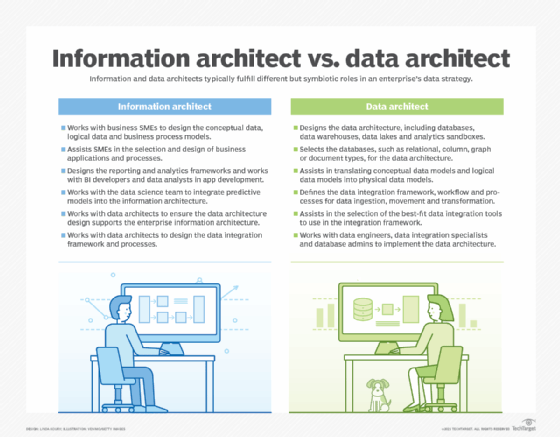What is a data architect?
A data architect is an IT professional responsible for defining the policies, procedures, models and technologies used in collecting, organizing, storing and accessing company information.
The position of data architect is often confused with data engineer. However, data architects focus on high-level business intelligence (BI) relationships and data policies, whereas data engineers handle the application of those relationships and policies to the design of specific databases.
As organizations have migrated to the cloud over the past decade, the role of the data architect has expanded and diversified. The data architect is still strategy- and design-focused, as opposed to the data engineer, and remains concerned with the big picture of the business -- especially BI. But this strategy and design influence over an organization's IT evolution now extends beyond basic data storage management to specific solutions and applications, artificial intelligence (AI), BI, cloud systems, complex security and enhancement of the business's perspective on data as actionable information. Put another way, data architecture now covers more than just a single role in the enterprise.
Responsibilities of a data architect
Data architects are the bridge between business operations and IT. Business operations collect and use the data, while IT acquires, stores and retrieves that information from database resources, within the technology architecture established by the company. As is common with IT jobs whose titles include architect, a data architect is primarily a planner and designer. They typically have a broad, companywide scope of operations.
Data architects have a range of responsibilities and work with several other roles and departments within the organization, including the following:
- Line organizations. Data architects often interact down to the level of key team leaders and managers. In many organizations, they play a key role in application design because of the relationships among business requirements, applications and data.
- Chief information officers. Data architects work with CIOs and their staff to communicate line organizational data collection and usage requirements and to align these requirements with the available database and application technologies available.
- Security. As the cloud footprint of the enterprise grows, more complexity accrues to data security. This is increasingly in the data architecture purview.
- Other data-related roles. Data engineers, database developers and specialists, database administrators and application development teams turn high-level data model and management policies into specific applications, database models and implementations.

Data architect skill requirements
Data architects require a mixture of business and technical skills. The primary skills required lie in the translation of business requirements and business operations practices into data collection and management policies. Experience in the field of enterprise architecture (EA) is particularly helpful. Some enterprises broaden the concept of data architect to the more general solutions architect, representing a closer tie to EA in those organizations.
Specific business-level skills needed by data architects include an understanding of the following:
- The process of translating business requirements and processes into data collection and usage principles.
- Data analytics and their application and importance within the business.
- The principles of EA in translating business processes to IT applications.
- The growing role of machine learning in the enterprise, how AI applications work and how big data differs from conventional data.
- A detailed knowledge of the way their company does business today and its plans for changes in practices and goals -- this can be acquired on the job if the time to accomplish that is available.
Data architects must also consider the high-level technical architecture, including database structure, database management, and operating system and programming language constraints. Therefore, they also require at least a high-level understanding of these areas. However, many organizations feel that the best data architects are generalists with respect to IT and database technology, rather than people who have worked in specific technical implementation jobs.
Specific technical skills required of data architects include knowledge of the following:
- Various database models and how they're best used.
- The principles of data management and database access and management.
- The enterprise's IT environment, including the current use of any database products, application programming interfaces, query languages and public cloud computing.
Data architects vs. data engineers
Some organizations might merge the data architect and data engineer roles, but they have distinct differences. Industry best practices suggest that data architects are responsible for high-level data policies and data management practices. Data engineers are responsible for applying those policies and practices via specific database management system implementations.
Data engineers tend to have a continuous relationship with database design and management. In comparison, data architects influence higher-level decisions on data-to-operations relationships that might change less often. However, when these relationships change, it can result in broad impact on database design and management and on the responsibilities of a data engineer.
Different roles in data architecture
Data architecture exists in several different forms. It isn't just one narrow role; it's several different ones, each with their own institutional nuances and each fitting into the bigger organizational IT picture in a different way. The following summarizes the different types:
- Data architect. Sometimes called enterprise data architect, this is the cornerstone architect type. This person oversees the overall data architecture of the enterprise, covering architecture strategy, design and implementation.
- Solutions architect. Also referred to as an applications architect, this position is less big-picture and more domain-specific, applying strategic and design skills to specific projects.
- Information architect. This data architect has an enterprise-wide perspective but is focused more on the business side of data organization and management, including governance.
- Cloud architect. Cloud architects tend to have an enterprise-wide focus as well, but their skills are specifically oriented toward optimizing architecture in the cloud for access and utility. Database administrators might be attracted to this role, as cloud database architectures -- modern data warehouses and data lakes in particular -- offer fresh and challenging variations on familiar concepts and practices.
- Machine learning architect. Also sometimes called a big data architect, this architect specializes in large bodies of data, as in the training sets required by machine learning and AI applications. Tech-minded data analysts and data scientists can transition to this role; those experienced in data analytics can find this role satisfying, especially if they have Python experience.
- Security architect. This architect specializes in ensuring that data architecture strategy, designs and implementation are as secure as possible and has input into institutional data security policy.
- Project manager. There's great merit in putting experienced data architects in charge of data architecture initiatives and projects, as both the nuances and broad consequences of data architecture can have tremendous impact, which an experienced data architect understands.

Data architect career path and salary outlook
Normally, data architects can follow these three primary career paths:
- Advance through IT management to the level of CIO as IT grows more data-centric.
- Evolve to become enterprise architects and to lead EA groups within an organization. From this role, data architects could then also advance to IT management jobs, including CIO and line organization leaders.
- Seek employment with IT software vendors, system integrators, or IT and management consulting organizations.
According to Glassdoor, as of July 2024, the average annual salary for a data architect is $135,377. According to ZipRecruiter, for the same period, data architect salaries are as high as $217,000. Total compensation depends on education, location, years of experience and bonuses.
Data architect prerequisites and certifications
Respected education and certifications for the data architect role include the following:
- A bachelor's or master's degree in computer science or data science.
- Several years of experience in IT prior to architect role is generally desired, usually as an application developer or database developer.
- DAMA International's Certified Data Management Professional certification.
- Certifications in Python.
- Enterprise architect certifications for The Open Group Architecture Framework or Information Technology Infrastructure Library.
- IBM Certified Data Architect certification.
Public cloud providers, including Amazon Web Services (AWS), Google, IBM, Microsoft and Salesforce, offer data architecture-related certifications. These should be considered as enhancements to more general certifications, such as those listed above.
Machine learning expertise is in high demand. Learn what machine learning certifications AWS, Google, IBM and Microsoft offer to help IT professionals further their careers.






